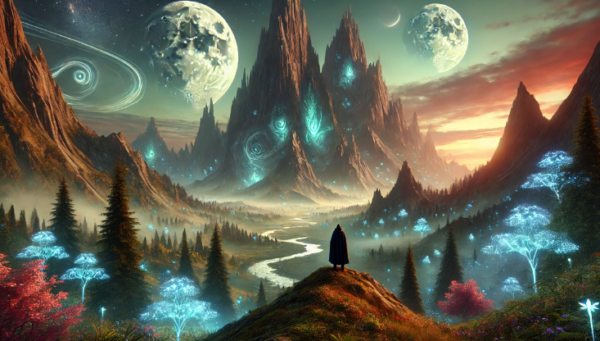Ah, inspiration—the mythical creature every writer chases but rarely catches when it’s most needed. It’s always there when you’re brushing your teeth or stuck in traffic but vanishes the moment you sit down to face the intimidating glare of a blank page. If you’ve ever found yourself staring hopelessly at your keyboard, wondering if the words will ever come, you’re not alone. Many writers—whether seasoned pros or first-time scribes—have been there, trapped in the purgatory of writer’s block.
But don’t despair! The good news is that inspiration isn’t as elusive as it seems. Like a hidden treasure, it just takes a bit of digging in the right places to find it. This article is your map to finding that creative spark, with 10 practical and often surprising tips to help you dream up story ideas, develop plot elements, find ideas, and create characters you can’t wait to write about. From people-watching to embracing your own story, these tips are designed to reignite your passion for writing.
Ready to turn writer’s block into a writer’s bloom? Let’s dive in!
1. Watch People: The Treasure Trove of Stories
People-watching is like having a front-row seat to the greatest show on Earth—an endless parade of quirky habits, fleeting emotions, and curious interactions. Ever noticed someone muttering under their breath while pacing the sidewalk or a couple in a coffee shop having an intense (but hushed) argument? These moments are pure gold for writers. Each gesture, expression, or snippet of conversation is a potential plot point, a spark of internal or external conflict, or the foundation for a fascinating character.
For instance, imagine you see a person on a train clutching a crumpled letter with a look of mixed desperation and resolve. What’s in the letter? Who sent it? What decision are they wrestling with? Congratulations, you’ve just stumbled upon the seed of a compelling plot.
Next time you’re out, let your imagination fill in the gaps of the stories unfolding around you. Watch closely, listen carefully, and don’t be afraid to jot down notes. Strangers are unwitting muses, and your next great writing inspiration might just be sitting at the next table.
2. Dive Into Daily Life for Hidden Gems
Inspiration doesn’t always require grand adventures or dramatic epiphanies. Sometimes, the most compelling stories are hidden in the quiet corners of your own life. Think about the mundane moments and real-life experiences that have shaped you: the awkward family dinners, the late-night epiphanies, or even the time you accidentally sent a text to the wrong person. These snippets of daily life can be the foundation for realistic plot elements or richly developed characters.
For example, a story about a protagonist stuck in a dead-end job could draw inspiration from your own experiences of frustration or longing. Or, that embarrassing high school crush might become the humorous subplot in a coming-of-age novel. By weaving in authentic emotions from your personal triumphs and struggles, you’ll create stories that resonate deeply with readers.
No experience is too small—life is a treasure trove of interesting ideas if you take the time to reflect. Dig deep, embrace the ordinary, and you’ll find inspiration in places you never expected.
3. Shake Things Up: Explore Different Genres and Forms
Sometimes, all you need to reignite your creativity is a change of scenery—on the page, that is. Sticking to the same genre or format can box you in while stepping out of your comfort zone can lead to unexpected breakthroughs. If you typically write sprawling novels, try crafting a short story with a punchy twist. If prose is your go-to, dabble in poetry to explore rhythm and imagery. Even experimenting with an unfamiliar genre—like switching from romance to sci-fi—can unlock fresh, different ideas and perspectives.
For instance, a mystery writer struggling with a plot might try writing flash fiction to explore concise storytelling or poetry to find new metaphors for tension. This shift can spark creativity and reveal new ways to tackle old problems in their main project.
The key is to keep things light and exploratory. You don’t have to be a master of every form—just take a break from your usual style and see where it takes you. Who knows? Your next big idea might come from an unexpected detour.
4. Read Widely: Your Personal Library of Ideas
Books are the ultimate fuel for a writer’s imagination. By reading across genres, exploring works from different authors, and diving into various time periods, you expose yourself to a kaleidoscope of storytelling techniques, narrative styles, and plot ideas. Believe it or not, reading can lead to some of your best writing. From the sweeping world-building of epic fantasy to the emotional intimacy of literary fiction, each book offers lessons you can adapt to your own story.
Practical tip: As you read, keep a notebook handy. Jot down compelling phrases, underline key details, or note how an author builds tension or develops characters. Did a particular plot twist leave you breathless? Analyze why it worked and how you might reinterpret it in your own words.
The beauty of reading widely is that it’s not about copying but about learning. You can take the essence of what inspires you—a theme, a structure, a single word—and transform it into something uniquely yours. Think of books as collaborators in your writing process, helping you expand your creative horizons one page at a time.
5. Visual Art and Nature: Inspiration Beyond Words
Sometimes, words aren’t the best starting point for a story—images are. Paintings, photographs, and the natural world offer a treasure trove of different forms of inspiration that goes beyond language. A vivid sunset might inspire the mood of a romantic scene, while a haunting photograph of an abandoned house could provide the perfect setting for your next mystery. Visual art and nature allow you to see stories in color, light, and texture, sparking ideas for everything from characters to key plot points.
For example, imagine coming across a painting of a lone figure standing on a windswept cliff. Who are they? What brought them there? Is it a moment of triumph, loss, or reflection? This single image could give new inspiration to inspire a main character or even the climax of your book.
Next time you’re stuck, visit a museum, browse photography portfolios, or take a walk in nature. Let the beauty—or mystery—of what you see ignite your creativity. Immersing yourself in art can sow the seeds of creativity in boundless ways, formats, and mediums. Sometimes, the perfect scene or plot element is waiting in the shape of a tree, the swirl of clouds, or the brushstrokes of a masterpiece.
6. Listen to Real People and Their Stories
Every person you meet is carrying a world of stories, waiting to be discovered. Conversations, anecdotes, and personal experiences shared by others can be an incredible source of inspiration for your writing. A casual chat with a neighbor might reveal a unique perspective, or a friend’s humorous mishap could evolve into a scene-stealing subplot. The key is to actively listen—not just to the words but to the emotions, motivations, and quirks that make each person’s story unique.
For instance, you might hear someone recounting a childhood memory of sneaking into an old amusement park after dark. What starts as a funny story could spark a thrilling plot point or an idea for a rebellious main character. Similarly, a stranger’s offhand remark about regret or love loss might evolve into the emotional heart of your story.
Great writers are great listeners. Pay attention to the rhythm of people’s words, the details they choose to share, and the silences they don’t. The more you engage with real voices, the more authentic and compelling your narratives will become.
7. Use Writing Prompts to Spark Creativity
Sometimes, all it takes is a single word or phrase to unlock your imagination and set your writing wheels in motion. Writing prompts—those simple yet evocative sparks—can be the perfect remedy for writer’s block. They challenge you to think differently, explore new ideas, and dive into stories you never thought you’d write.
For example, consider a prompt like “A letter arrives 20 years too late.” Suddenly, questions abound: Who sent the letter? Why was it delayed? How does it change the recipient’s life? Another favorite: “A character wakes up and realizes their reflection is missing.” This could inspire a thriller, a fantastical adventure, or a deep psychological tale.
To get the most out of prompts, start small—maybe start writing a scene or a short story—and let the ideas evolve. You’ll often find that a prompt doesn’t just lead to a standalone piece but can grow into a full-length novel with the right twists and turns. So, next time you’re staring at a blank page, grab a prompt and let it guide you into uncharted territory.
8. Join Writing Groups: Collaborate and Create
Writing doesn’t have to be a solo endeavor. Joining a writing group opens the door to collaboration, fresh perspectives, and invaluable feedback. Brainstorming with other writers can spark new story ideas you’d never have thought of on your own. Sharing your work, or hearing about someone else’s story, often leads to those “aha!” moments where a tricky plot point or character dilemma suddenly clicks.
Conversations with other writers are particularly inspiring because they understand the ups and downs of the writing process. Whether it’s an offhand comment about a plot twist or a suggestion to explore a new genre, these exchanges can light up your creative path. Plus, the camaraderie of being a good writer and part of a writing group can keep you motivated and accountable.
To find your tribe, look for local groups through community centers or libraries. Online options like forums, social media groups, or platforms like Meetup can connect you with writers who share your style and goals. Whether you’re swapping ideas, critiquing drafts, or simply commiserating over writer’s block, being part of a writing community can elevate your craft and keep your creativity flowing.
9. Embrace Your Own Story: Write What You Know
There’s a reason “write what you know” is such timeless advice—your own life is a goldmine of authentic inspiration. By mining your own life experiences, you can create characters with depth, emotions that ring true, and plots that resonate with readers. Whether it’s the sting of heartbreak, the joy of a personal victory, or the ache of unspoken regret, your lived moments are fertile ground for storytelling.
The magic lies in balancing the personal with the universal. A story rooted in your experience should connect to emotions many ideas and themes others can relate to—love, loss, ambition, or redemption. For instance, an internal conflict you’ve faced, like overcoming self-doubt, could shape your protagonist’s journey. Or, a real-life challenge, such as a tough decision or a pivotal mistake, can evolve into a compelling plot point.
Your story doesn’t have to be a memoir. Blend facts with fiction, enhance key details, and create new layers. By embracing your own story, you’ll craft narratives that feel genuine, even as they take on a life of their own.
10. Rest and Recharge: Let Inspiration Find You
Sometimes, the best way to spark the inspiration to write is to stop chasing it. Taking a break might feel counterproductive when you’re desperate to write, but rest is often the missing ingredient for creativity. Stepping away from your desk and engaging in seemingly idle activities—like walking, watching clouds, or even binge-watching a guilty pleasure show—gives your mind the space it needs to wander and connect new ideas.
Think about it: some of the best plot twists and character insights hit you while you’re in the shower or zoning out during your commute. That’s because your brain is still working on your story in the background, even when you’re not actively writing.
And let’s be real—sometimes you just need a nap. Even if you love writing, downtime is a productive practice too, as it recharges your creative energy and prevents burnout. So next time you’re stuck, don’t guilt yourself for stepping away. Inspiration has a funny way of showing up when you least expect it—maybe mid-yawn or halfway through a leisurely stroll.
The Next Chapter Is Yours
Inspiration might feel elusive, but as we’ve explored, it’s all around you. Whether you’re watching people at a café, drawing from your daily life, experimenting with new genres, or simply taking a well-earned break, there’s no shortage of ways to spark creativity. Dive into books, visual art, or nature, join a writing group, or use a prompt to get your best ideas flowing. Most importantly, embrace your own story—it’s a treasure trove of authentic and relatable material waiting to be shared.
Not every tip will resonate with every writer, and that’s okay. Start with what excites you, adapt as you go, and trust your creativity to lead the way. Writing isn’t just about creating—it’s about discovering. The more ideas you explore, the more inspired you’ll become.
And if you’re ready to turn your next story or great idea into a polished story, Spines is here to help. From brainstorming to the final draft, Spines is your creative partner, guiding you every step of the way. Let’s make your story unforgettable.







